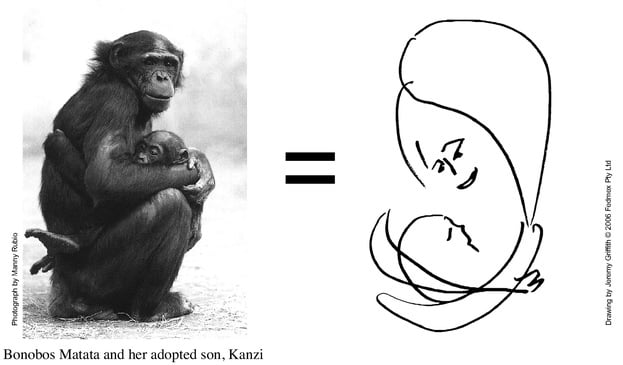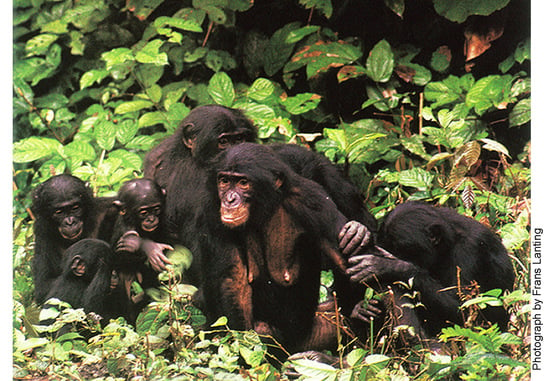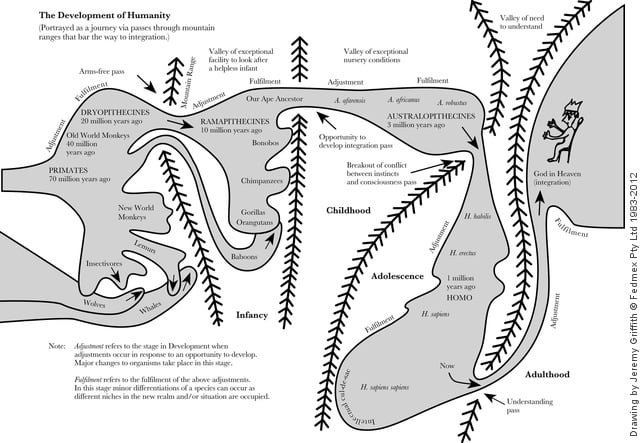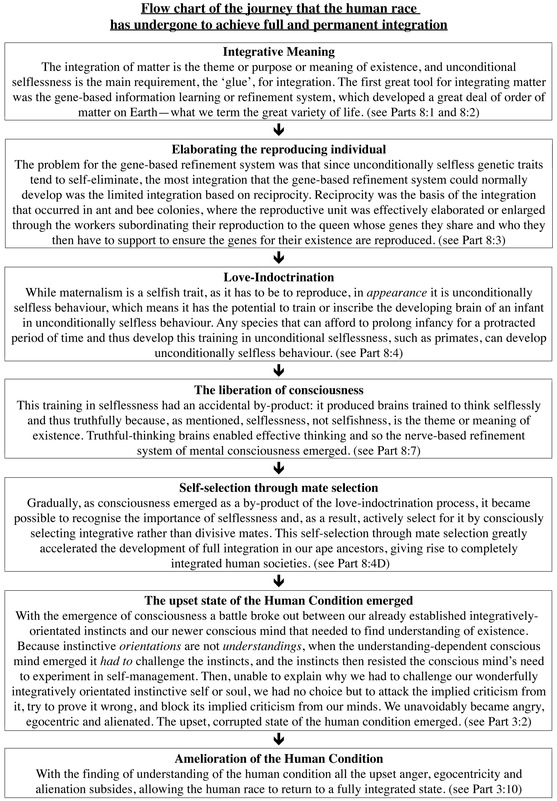Freedom Expanded: Book 1—The New Biology
Part 8:4I A summary of how humans acquired our unconditionally selfless moral soul
It is clear that bonobos are exceptionally peaceful and cooperative animals. Indeed, all the evidence provided indicates that they are a relatively large, multicellular species that is well on its way to developing the fully integrated state where the reproducing individual members live together in complete harmony and cooperation. Bonobos are living proof that through the love-indoctrination, mate selection process Negative Entropy did find a way to integrate members of a large multicellular animal species, and therefore evidence that our ape ancestors were able to develop the totally integrated ‘Garden of Eden’, ‘Golden’, completely cooperative state that all our mythologies recognise we once inhabited.
(It might be mentioned that Matata and Kanzi, the bonobos pictured on the left in this wonderfully evocative photo of nurturing above, are famous participants in the ground-breaking studies of language development that was undertaken by the aforementioned biologist, ape-language researcher and author Sue Savage-Rumbaugh at the Great Ape Trust in Iowa.)
Yes, all the evidence points to the fact that it was through nurturing that we humans acquired our instinctive orientation to behaving in an unconditionally selfless, loving, cooperative way; that it was through nurturing that humans acquired our moral ‘soul’, the guiding ‘voice’ of which is our ‘conscience’. As emphasised earlier, nurturing was the main influence or prime mover in human development—not tool use or bipedalism or language development or mastery of fire or any one of the other evasive explanations that denial-complying biologists have been putting forward in the mountain of books that have been published on human origins. Again, much more will be said about the whole problem of denial that surrounds the study of human evolution in Part 8:5, but imagine how different all the interpretations gathered through our studies of primatology and anthropology and even archaeology are going to be now that we have explained the human condition and can finally stop practicing denial—particularly denial of two of those six great previously unconfrontable truths of the importance of nurturing in both the maturation of our species and the maturation of our own lives, and that we humans did once live in an unconditionally selfless, fully integrated, cooperative, harmonious, loving state. Imagine how our understanding of almost every aspect of human history will change when we are prepared to acknowledge our species’ ever-increasing levels of alienation from an original state of innocence and soundness. Imagine how our ability to acknowledge that early humans were happy and altruistic and could think truthfully is going to change our perception of all the events that have led to the immensely upset state of humans today! Well, this whole presentation is witness to how much clarification of our history and behaviour is made possible by being truthful instead of dishonest.
The denial of truth has become a plague, preventing all access to truth—as Jonathan Wise’s exceptionally honest comment, included in Part 5:1, recognised: ‘if there really is hope beyond the human condition, then the Truth that leads to it has to have been established by someone beyond the human condition. Us humans are way too good at rationalizing truth into any shape that pleases us.’ Yes, this is so true—you couldn’t look into the human condition from within it, the dishonesty going on within that old paradigm was far too rampant.
The truth is it was our ape ancestor’s exceptional facility to develop nurturing that enabled us humans to acquire an instinctive orientation to behaving in an utterly cooperative, non-competitive, fully harmonious, unconditionally selfless, genuinely altruistic, truly loving way towards each other—but until we found understanding of the human condition this fact, that our human ancestors once lived in a fully cooperative state, could not afford to be admitted by denial-complying mechanistic science. It was only in our mythologies and through the words of a few brave thinkers that the truth of a wonderful ‘Golden Age’ of cooperative existence in our species’ past survived.
Indeed, this photo of bonobos certainly evokes the recognition that we too once lived in a ‘Garden of Eden’ state, and confirms that when our myth-makers spoke of our forebears living in a ‘Garden of Eden’, fully cooperative, loving state they were not indulging in some romantic fantasy as E.O. Wilson accused Rousseau of doing, but describing an actual historical state that did once exist. And from the evidence provided we can establish that this love-indoctrination process started some twelve million years ago and was perfected about five million years ago, after which we lived in a fully cooperative state until the upset state of the human condition fully emerged some two million years ago.
In summary, all the evidence indicates that it was through nurturing, the process of love-indoctrination, and the accompanying mate selection of cooperativeness, that humans were able to develop an instinctive orientation to behaving unconditionally selflessly and, as a result, become a totally integrated multicellular species. The evidence shows that in our instinctive past, prior to our conscious mind becoming extremely upset and afflicted by the burden of the human condition some two million years ago, all humans were selfless and considered the welfare of the group above their own welfare. An instinctive memory within us of this upset-free, loving, cooperative, moral, innocent, alienation-free, all-sensitive, heavenly childhood state is what we have termed our ‘soul’, one expression of which is our ‘conscience’, the instinctive expectation within us that we behave morally—that is, selflessly, lovingly and cooperatively towards all of existence. These explanations and the evidence for them shows that humans do have genuinely altruistic instincts—that our selfless moral nature is not derived from the subtle form of selfishness that is reciprocity, but from an instinctive orientation to behaving in a truly unconditionally selfless way.
So, love-indoctrination enabled genetic refinement’s seeming inability to develop unconditional selflessness to be overcome, and the love-indoctrinated development of unconditional selflessness allowed consciousness to emerge, and with the emergence of consciousness came the ability to support the love-indoctrination process by actively ‘self-selecting’ for cooperativeness by selecting more cooperative individuals with which to mate. If we add to that progression the emergence of the upset state of the human condition, and then the development of science, and then having to overcome our denial of any truths that brought the issue of the human condition into focus, it was an absolutely extraordinary sequence of events that the human race has journeyed through.
With the human condition now explained, we can finally understand and thus safely admit that nurturing, a mother’s love, is what made us human; it is what gave our species its awe-inspiring moral sense. The female gender created humanity.
The following drawing summarises the development of humanity.






